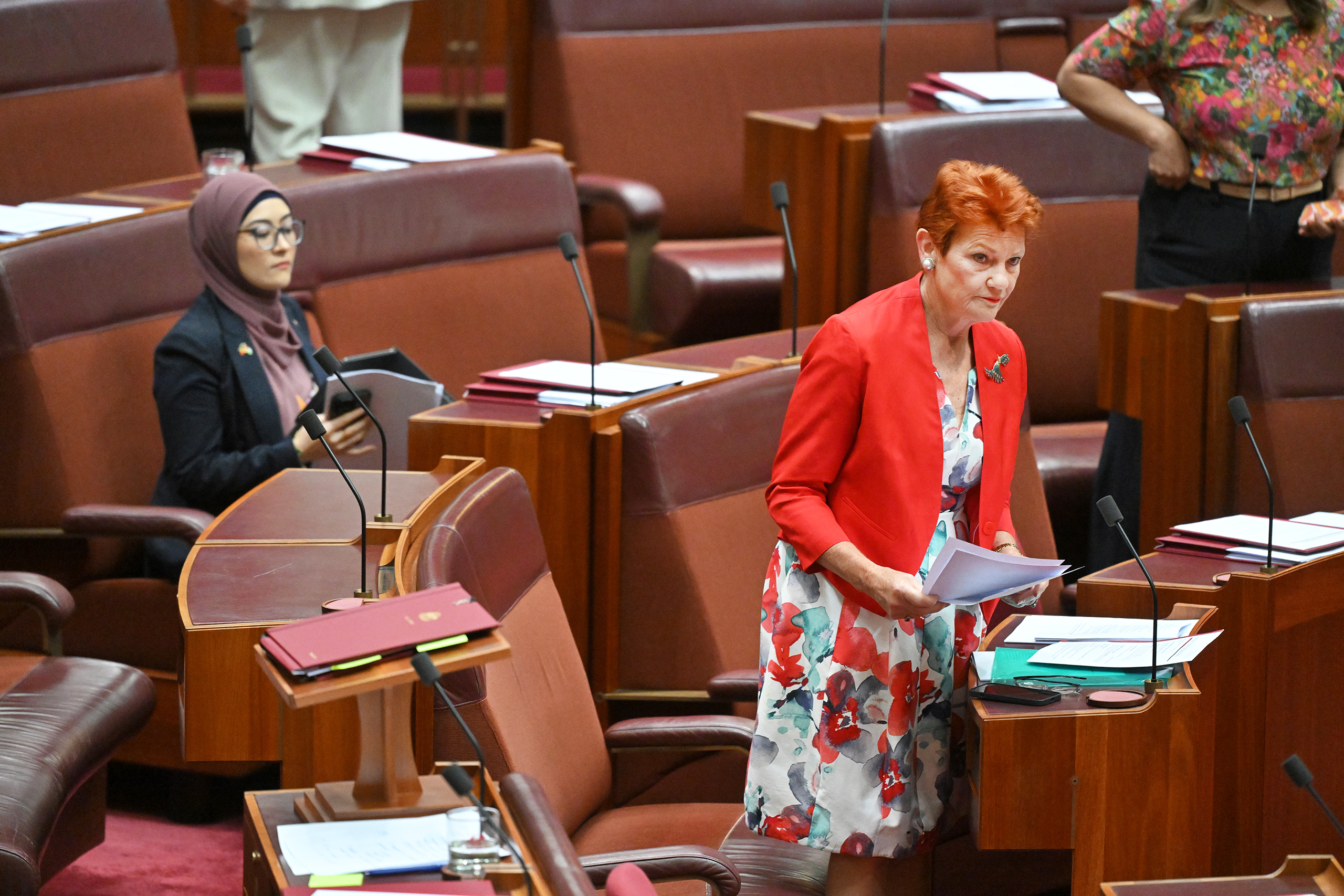This has not been a great year for Pauline Hanson. On 1 November her actions were the subject of a lacerating judgement from Justice Andrew Stewart in the Federal Court case of Faruqi v. Hanson. Not mincing his words, the judge stated that “Senator Hanson has a tendency to make negative, derogatory, discriminating or hateful statements in relation to, about or against groups of people relevantly identified as persons of colour, migrants to Australia and Muslims, and to do so because of those characteristics.” He also found her an unimpressive witness: “I was left with the distinct impression that Senator Hanson would say anything that came to mind if she thought that it would suit her at that time; she had little regard to whether what she said was true or false. Her evidence is generally unreliable.”
It was not only from the bench that her attitudes came under attack. In the Senate on 27 November, Senator Fatima Payman, an Afghanistan-born senator riled beyond measure by Hanson’s attempts to question her eligibility to sit in the parliament under section 44(i) of the Constitution, delivered a withering blast probably without precedent since Julia Gillard’s famous “misogyny speech” of 9 October 2012 directed against Tony Abbott:
All that Senator Hanson does in this place is spread hatred and spread division because that’s what she’s made to do here. It’s outrageous. It’s beyond comprehension… Senator Hanson has said, “I challenge anyone to tell me one thing that I’ve said that is racist.” Here I begin — there are a few. There are so many we could be here all day. She said, in her first speech, “I believe we are in danger of being swamped by Asians”… Somebody bring the dictionary because Senator Hanson does not know the definition of racism… The fact that you would say, just weeks ago, to Senator Faruqi, “Piss off back to Pakistan,” means you’re not just vindictive, mean, nasty; you bring disgrace to the human race — no dignity whatsoever as a senator in this prestigious place, where we’re supposed to bring unity and where we’re supposed to have that freedom of expression, yes, but within the boundaries and confinements of respect.
She concluded with a peroration with which many of her listeners would have identified:
I kept on giving you the benefit of the doubt, Senator Hanson, despite your repetitive attempts to be racist to anyone who does not look like you… How do you live with yourself, Senator Hanson, with so much vile hatred? How do you live through your days spreading hatred? How do you go to sleep? How do you look your neighbours in the eye knowing that you come to this place and spread the vile hatred, the vile comments that you make? It’s disgraceful. It’s disgusting. I have no other words to describe your actions.
Was Senator Payman right to feel so aggrieved? The answer, almost certainly, is yes.
The background to this dispute is to be found in section 44(i) of the Australian Constitution, which provides that any person who “is under any acknowledgment of allegiance, obedience, or adherence to a foreign power, or is a subject or a citizen or entitled to the rights or privileges of a subject or a citizen of a foreign power” shall be “incapable of being chosen or of sitting as a senator or a member of the House of Representatives.” This provision, however, needs to be understood as judicially interpreted — on a literal reading, it would allow a malignant foreign power to enact a law declaring an Australian MP or senator to be a citizen of that foreign power, and thereby procure his or her removal from the parliament, which would be manifestly absurd and not what the drafters of the Constitution intended.
In a series of cases — Sykes v. Cleary (1992), Re Canavan (2017), and Re Gallagher (2018) — the High Court explored the meaning of section 44(i) and, in the last of these cases, five justices jointly affirmed an implied exception to the stringent application of section 44(i), namely that “an arbitrary or intransigent operation of the law of another country cannot be permitted to frustrate the ability of… an Australian citizen to participate in the parliamentary and executive government of Australia”; and stated that “The implied exception cannot be engaged unless and until such time as such process of renunciation as is provided for by the law of the other country can be characterised for practical purposes as a process that will not permit the person to renounce the foreign citizenship by taking reasonable steps, requiring if not that an impasse has actually occurred then at least that an impasse can be confidently predicted.”
Indeed, Senator Hanson’s fellow One Nation senator, Malcolm Roberts, had been found to be unqualified for election, Justice Keane having concluded in Re Roberts (2017) that “as at the date of his nomination for the Senate, he knew that there was at least a real and substantial prospect that prior to May 1974 he had been and remained thereafter a citizen of the United Kingdom.”
Ms Payman herself was entirely candid in acknowledging her Afghan citizenship when she nominated for election in 2022. Until August 2021 — well before she nominated — Afghan law provided a process for renouncing Afghan citizenship, and in 2019 a Liberal candidate found herself in potential peril for having failed to complete this process. But on 15 August 2021 the situation changed dramatically. The Republican government in Afghanistan, abandoned by its US ally, was toppled by the extremist Taliban movement, which proceeded to abrogate the 2004 Constitution. This was critical, because Afghan law on renunciation of citizenship required a decision of the president of Afghanistan (Rais-e Jamhur) to give effect to a renunciation application, and since August 2021, Afghanistan has had no president.
The process of renunciation under Afghan law also required an application through an Afghan embassy, but the Afghan embassy in Canberra, which represents the state of Afghanistan, has never engaged with the Taliban — unsurprisingly, since the Taliban have appointed a number of sanctioned terrorists as “ministers.” Furthermore, given that the Australian Department of Foreign Affairs and Trade has long had in place an emphatic “Do Not Travel” warning for Afghanistan, a trip to Kabul offered no realistic pathway of engagement either.
The consequence is that an Australian with Afghan nationality has had no legal or practical paths since August 2021 for relinquishing such nationality. The “implied exception” endorsed by the High Court manifestly applied to Fatima Payman as a candidate in 2022.
This was doubtless the reason why Pauline Hanson’s One Nation made no attempt to challenge Senator Payman’s election in 2022. Documents relating to her eligibility were accessible to the public through the website of the Australian Electoral Commission, and under section 355 of the Commonwealth Electoral Act 1918 it would have been open to a One Nation candidate in Western Australia to challenge Senator Payman’s eligibility for election by petition to the High Court (sitting as the Court of Disputed Returns) within forty days of the return of the writ for the election. That One Nation made no such attempt at the time strongly suggests that Senator Hanson’s attempt to raise the issue in the Senate years after the election was a political stunt to energise her base rather than a serious attempt to explore a constitutional issue.
The wider political explanation for Hanson’s attack most likely lies in the populist character of One Nation’s mindset. Populist political mobilisation thrives on a search for enemies within, with targets ranging from “witches” in seventeenth-century Massachusetts to Jews in nineteenth- and twentieth-century European states. When first elected to parliament as an independent, Hanson targeted “Asians”: “They have their own culture and religion, form ghettos and do not assimilate.” By the time she returned to the Senate in 2016, she had found a new target: “Muslims”:
Islam cannot have a significant presence in Australia if we are to live in an open, secular and cohesive society. Never before in Australia’s history have we seen civil unrest and terror associated with a so-called religion, or from followers of that faith. We have seen the destruction that it is causing around the world. If we do not make changes now, there will be no hope in the future. Have no doubt that we will be living under sharia law and treated as second-class citizens with second-class rights if we keep heading down the path with the attitude, “She’ll be right, mate.” Therefore, I call for stopping further Muslim immigration… In addition, no more mosques or schools should be built.
Senator Payman has the misfortune to represent everything that One Nation and its backers resent: she is of Asian background, Muslim, and young and highly educated. Senator Hanson, by contrast, is “Anglo,” over seventy, and without higher education. Senator Payman embodies the cultural diversity of modern Australia; Senator Hanson stands for an old Australia that has gone for good. With One Nation securing only 4.96 per cent of the vote in the 2022 House of Representatives election and only 7.4 per cent of Senate votes in its Queensland heartland, Senator Hanson represents not a silent majority but an ageing, embittered minority. No wonder it sticks in Senator Hanson’s throat to see someone like Senator Fatima Payman sitting in the Senate. •




